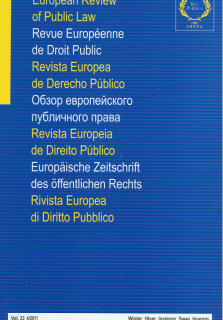
The Individuals' Fragmented Political Autonomy:
Surveillance of Public Spaces, Anonymity
and the Myth of 'Public Security'
Christina M. Akrivopoulou
PhD Constitutional Law, Special Scientist of the Democritus University of Thrace (DUTH),
Post Doctoral Researcher of the Greek Scholarships' Foundation
This paper is critically commenting on the augmenting policy of public surveillance through the 'Public Camera Surveillance' system (CCTV technology) in Greece and in other countries such as the UK, USA, Canada and Australia. It presents the arguments in favor and against such policies and the main threats that such policy-making poses for the freedom of the individual as represented in the relevant jurisprudence of the ECtHR. The main argument of the presentation underlines the need for the interpretive deduction of a right to anonymity or otherwise of a right to public privacy from the traditional notion of privacy. This right enables the individual to enjoy his/her privacy in public, thus allowing him/her to circulate in public assured that its presence will remain anonymous and permitting him/her to merge with the rest of the crowd. Such a right is specifically valuable in order to protect the political autonomy of the individual as a participant of demonstrations and public movements or manifestations under the precondition that his/her deeds do not merit the state's intervention. The presentation closes with some remarks on the changing social and political ethos that brings forward the demand of public surveillance as a need for public safety.
Cet article critique la politique croissante de surveillance publique par le système de caméras de surveillance publique (télévision en circuit fermé) en Grèce et dans d'autres pays comme le Royaume-Uni, les USA, le Canada et l'Australie. Il présente les arguments pour et contre de telles politiques ainsi que les principales menaces que pose une telle politique pour la liberté de l'individu, comme cela apparaît dans la jurisprudence pertinente de la CourEDH. Le principal argument de la présentation souligne la nécessité de déduire par interprétation du concept traditionnel de vie privée un droit à l'anonymat ou, sinon, un droit au respect de la vie privée en public. Ce droit permet à l'individu de jouir de sa vie privée en public, donc de circuler en public en étant assuré que sa présence restera anonyme et qu'il se fondra dans la foule. Un tel droit est particulièrement précieux au regard de la protection de l'autonomie politique de l'individu quand il participe aux manifestations et autres mouvements publics, à condition que ses actes ne méritent pas l'intervention de l'Etat. La présentation se termine par quelques remarques sur les mœurs sociales et politiques changeantes qui mettent en avant la demande de surveillance publique comme une nécessité de sécurité publique.





















